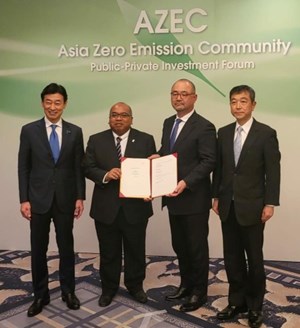Joint study of sustainable palm oil industry development in Malaysia
JGC Holdings Corporation and Japan NUS (JANUS) have signed a memorandum of understanding with the Malaysian natural gas sales, marketing, and distribution company Gas Malaysia Bhd (GMB) for joint study of sustainable domestic palm oil industry development through effective utilization of unused resources from palm oil milling in the country.
From left to right, Yasutoshi Nishimura (Ministry of Economy, Trade and Industry), Shahrir Bin Shariff(Gas Malaysia Bhd), Masahiro Aika (JGC HD), Kazuhiko Chikamoto(JANUS)
Malaysia is the world's second largest producer of palm oil after Indonesia. Palm oil is a useful product, whether as a cooking oil or an ingredient in cosmetics and many other daily necessities, but palm oil mill effluent and empty fruit bunches (POME and EFB, respectively) from the production process emit large amounts of methane gas, which is said to have a greenhouse effect 25 times that of CO2. This environmental issue hampers the country's efforts toward carbon neutrality. Another challenge is that the palm oil industry discards thinned wood, waste wood, and other potential raw materials for biocrude oil or biochemicals without using it.
This project will study the feasibility of converting the methane sources of POME and EFB into biomethane fuel and pellet fuel through recovery and processing. Potential biocrude oil and biochemical applications for thinned and waste wood will also be investigated. Participants intend to contribute to sustainability in the palm oil industry through effective utilization of the unused resources generated by the industry, with another goal being reduction of Scope 1 CO2 emissions by energy and biofuel consumers.
Specifically, GMB will provide information on facilities with good access to feedstock in Peninsular Malaysia and on bioenergy (including natural gas) distribution networks. JGC Holdings and JANUS will study the solutions needed to convert industrial POME, EFB, and thinned/waste wood to biofuel and biochemicals. The supply chain will also be studied, with one facet being the optimal means of supplying fuel to small general services in Malaysia through biofuel liquefaction. This research will extend to the use of carbon credits, biomethane certification, and other systems that enhance the sustainable value of any products resulting from the project.
The joint study will tie in with the Asia Zero Emission Community (AZEC) Initiative announced by the government of Japan in 2022.
GMB is making strides in renewable energy to foster long-term sustainable development in its business activities, guided by its vision to be an innovative value-added energy solutions provider. This venture is part of GMB's diversification strategy to grow its non-regulated business adjacent to the gas value chain to further consolidate its position in the industry. With this initiative, it will enable GMB to be a catalyst for the greater use of green gases.
JGC has accelerated its energy transition initiatives, working toward a low-carbon future in line with the May 2021 long-term management vision and the medium-term business plan (2040 Vision and BSP 2025). In Malaysia, the Group has an extensive track record in plant construction for liquefied natural gas, oil refineries, and other facilities. This experience, along with project management capabilities honed through many projects, will be applied in the joint study with GMB.
Related News
Related News

- RWE strengthens partnerships with ADNOC and Masdar to enhance energy security in Germany and Europe
- TotalEnergies and Mozambique announce the full restart of the $20-B Mozambique LNG project
- Five energy market trends to track in 2026, the year of the glut
- Venture Global wins LNG arbitration case brought by Spain's Repsol
- KBR awarded FEED for Coastal Bend LNG project




Comments